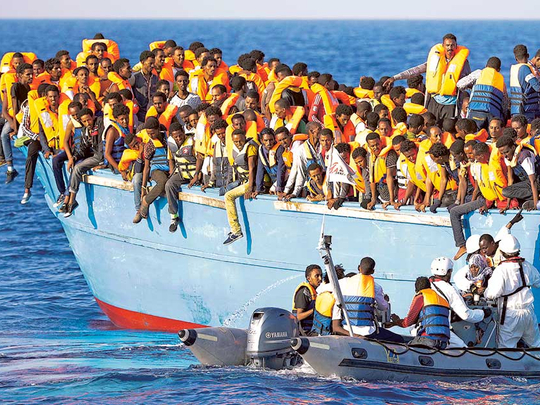
Berlin: Refugee deaths in the Mediterranean Sea this year are poised to eclipse all of 2015, even as fewer people hazard the journey.
Italian Prime Minister Matteo Renzi and German Chancellor Angela Merkel agreed on Wednesday to step up efforts to send migrants with no right to asylum in Europe back to their homelands.
“All of us in Europe must work for the repatriation of those who do not have rights (to stay),” Renzi said after a meeting with Merkel in the Italian town home to the Ferrari sports car empire. “It is unthinkable that we can accommodate everyone.”
In comments pointing to a hardening of attitudes about how to resolve the migrant crisis reshaping politics across Europe, Merkel added: “Not everyone can stay, and Italy has the same problem, so we have a common agenda.
“Those who do not have the right to stay have to be repatriated,” she said.
The German leader was speaking a year to the day after she after she won praise and criticism in equal measure for signalling an open-door policy on refugees by declaring “we can do this”, referring to people fleeing the conflict in Syria.
She said on Wednesday that she stood by her words.
“I’m convinced it was the right phrase,” she said, striking a less contrite tone than she had adopted in an interview with German daily Sueddeutsche Zeitung that was published on Wednesday.
Merkel was quoted by the newspaper as saying: “There are political issues that one can see coming but don’t really register with people at that certain moment.”
“And in Germany, we ignored both the problem for too long and blocked out the need to find a pan-European solution.”
Merkel pointed on Wednesday to the controversial EU-Turkey deal signed in March aimed at stemming the flow of migrants to Europe as an example of how cooperation could help “halt illegal migration”.
She added that economic incentives should be used to help would-be migrants remain in their own countries.
“It is important that we make deals with the countries of origin,” Merkel said, giving the example of the deal struck between Italy, France and Germany and Mali and Niger to promote economic growth in the sub-saharan countries.
The United Nations refugee agency recorded 3,167 migrants dead or missing at sea in the first seven months of 2016 compared with 3,771 in all of last year, according to figures updated Wednesday. While the number of crossings has dropped by two-thirds, those that are attempting the perilous voyage are facing greater dangers.
“This year has been particularly deadly; smugglers are taking even bigger risks than in the past and basically sending people to their deaths,” UNHCR spokesman William Spindler said in an interview.
“It’s a combination of the declining quality of the vessels they’re using — putting people onto anything that floats — and cramming more people onto boats.”
Images of refugees crossing the Mediterranean are feeding a global debate over immigration that is dividing electorates across the western world. The Syrian war and Islamic terrorism, plus the drive to escape poverty in Africa, mean Europe is in the throes of the biggest influx of refugees since the Second World War, stoking populist sentiment from the UK to France and Germany.
At its peak last summer, the influx of migrants from the Middle East and North Africa destabilised European Union governments and threatened to break the bloc’s passport-free travel zone as national authorities closed borders and refused to accept refugees. Following an agreement in March between the EU and Turkey to stem refugee flows through Greece, numbers have dropped and attention has shifted to the more dangerous central Mediterranean route to Italy.
Although the number of arrivals to the EU has fallen, the crisis could yet become a lightning rod in elections in France and Germany next year.
Efforts to stop people making the journey from Northern Africa to Italy are complicated by a fragile national-unity government in Libya as well as a region destabilised by civil war and conflicts with the Islamic State.
As waves of migrants lined up to cross to Europe, people smugglers changed the way they operate, now taking more risks by sending people on rubber dinghies rather than small fishing boats, transferring people to larger boats in the middle of the sea to avoid detection and sometimes putting people on vessels with insufficient fuel, Spindler said.
The influx of migrants to Greece has decreased dramatically since March’s EU-Turkey deal and the closure of the border between Greece and Macedonia. Last month 3,437 migrants arrived in Greece compared with 107,843 last August. In Italy, 11,854 people arrived last month, compared with 22,609 in the year-ago period. Nearly 3,000 entered on Tuesday alone, the most in a single day since June 28.
“We have seen increased figures in recent days but this is still significantly lower than the same period last year,” European Commission spokeswoman Natasha Bertaud told reporters in Brussels on Wednesday. “It’s quite common for arrival figures to change on a daily basis and it’s quite difficult to decipher trends until a little bit after the fact. But at the moment we’re still in a situation that it’s a lot less than last year.”












